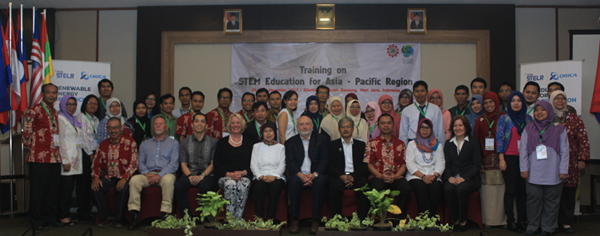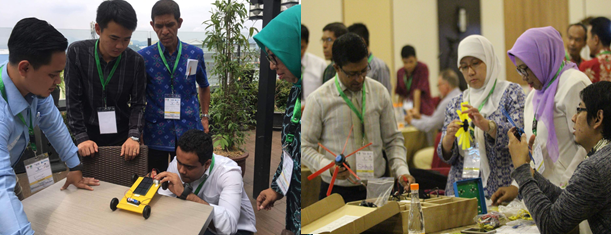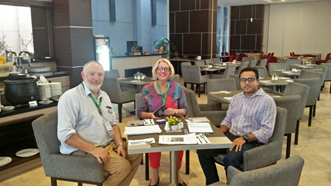STEM Education Training for Asia-Pacific Region 20-24 November 2017, Bandung- Indonesia
Go Back

A Five-day Training on STEM for Asia Pacific was held from 20-24, November in Bandung, Indonesia hosted by the SEAMEO (South East Asia Ministers of Education Organization, QITEP (Quality Improvement in Teaching and Education Personnel) Programme. The training workshop was conducted by the Australian Academy of Technological Sciences and Engineering (ATSE) and sponsored by Orica (an Australian Mining Company) that focused on addressing the key global challenges using the Science, Technology, Engineering Mathematics (STEM) education incorporating inquiry based science education pedagogical approach.

The workshop used the STELR (Science and Technology Education Leveraging Relevance) model, which is the flagship Program of ATSE to raise awareness of the potential of STEM in developing solutions to critical issues such as climate change, energy, water and sustainability. The unique aspect of STELR model is to highlight the relevance of STEM education and encourage students for consideration of STEM careers to address global challenges. The workshop was attended by 41 participants from eight different countries. On behalf of ECOSF, Engr. Khalil Raza Scientific Officer ECOSF participated in the training workshop.
The training workshop was opened by Prof. Dr. Tryanta, Director Center of SEAMEO QITEP in Science. In his opening remarks, he appreciated the ATSE for brining in their expertise to promote STEM education in the Asia Pacific region. He said STELR project is significant for teachers to explore the principles of STEM education with special relevance to local challenges that could raise interest of students to choose science and technology tracks in their careers and help them make meaningful contribution. He encouraged all participants to fully contribute to this workshop and integrate acquired knowledge and techniques back into their classroom.
Training workshop was conducted by the Australian experts; Peter Pentland, ATSE Executive Manager Education, Pennie Stoyles, STELR Program Manager, Dr. Connie Cirkony from Deakin University, Dr Greg Smith from Charles Darwin University and Simone Lewis from Southern Cross University. Mr. Peter Pentland gave an overview and outline of the workshop. He said STELR is a STEM program that provides inquiry-based, hands-on programs for secondary school students and it uses specialized kits and equipment developed for school students for making science, maths, engineering and technology activities fun and easily understandable. The workshop introduced various concepts and techniques to provide relevant STEM techniques. The renewable energy and climate change were the core areas of the workshop.

Ms. Penie Stoyles STELR Program Manager as one of the resource persons gave a brief introduction to STELR program which takes into account a number of techniques such as hands on, Inquiry based, use of science kits and more importantly developing a context between STEM and global challenges. Participants were engaged to carry out a number of hands-on activities and perform experiments on energy transformations with special focus on wind and solar energy experiments. The trainers used an IBSE approach which engaged the participants to put forward their original thoughts to a specific problem and to test their pre-determined concepts and beliefs. Later these concepts were tested using a scale of experiments enabling participants to question and explore their original concepts that enabled them to develop alternate inquiries. At the end of each activity, the original concepts were evaluated and assessed with test results which helped participants to develop deeper understanding, feedback and making final conclusion to their initial bias of any particular problem. Similarly, participants worked and performed on hands-on activities focused on climate change, water and sustainable housing throughout the workshop.
 During the workshop, Engr. Khalil Raza had an opportunity to discuss collaboration between ATSE STELR program and ECOSF with Mr. Peter Pentland and Ms. Penie Stoyles to discuss collaboration. Mr. Khalil gave them a brief overview of ECOSF programs and initiatives to promote STEM education and Inquiry Based Science Education in the ECO region. Mr. Pentland highlighted the importance and its key features of STELR program and its implementation at school level in Australia and many other countries in the Asia Pacific. It is important to note that core areas of STELR program align well with the priority research areas of the ECOSF i.e., climate change, energy and water. Both sides looked forward to developing cooperation and collaboration to implement STELR program in the ECO region.
During the workshop, Engr. Khalil Raza had an opportunity to discuss collaboration between ATSE STELR program and ECOSF with Mr. Peter Pentland and Ms. Penie Stoyles to discuss collaboration. Mr. Khalil gave them a brief overview of ECOSF programs and initiatives to promote STEM education and Inquiry Based Science Education in the ECO region. Mr. Pentland highlighted the importance and its key features of STELR program and its implementation at school level in Australia and many other countries in the Asia Pacific. It is important to note that core areas of STELR program align well with the priority research areas of the ECOSF i.e., climate change, energy and water. Both sides looked forward to developing cooperation and collaboration to implement STELR program in the ECO region.
During the concluding ceremony, Dr. Indarjani Deputy Director SEAMEO QITEP in Science in her remarks highlighted the importance of STEM education and its relevance in the Asia Pacific Region to address the key challenges. This training is important for school kids and this training workshop is an opportunity for teachers and educational professionals to realize its potential and meaningful impact that it can make on producing critical thinkers and responsible citizens of tomorrow, she opined. Ms. Elizebeth Campbell-Dorning, the Education Attache’ at Australian Embassy in Indonesia in her closing remarks stressed over the need to provide right skills especially in STEM education for developing sustainable future. She greatly appreciated the team of SEAMEO QITEP, ORICA and ATSE for their contribution in making this workshop a great success.